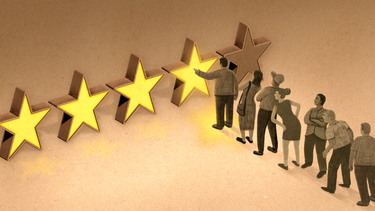Behavioral
Can AI Replace Human Debt Collectors?
New research co-authored by Yale SOM Professor James Choi finds that people are less likely to follow through on a commitment to repay a debt if it’s made to an AI agent. The finding hints at one area where humans may always retain an advantage over bots.

We Expect to Be Rewarded for Results, Not Hard Work
Prof. Corey Cusimano and his co-authors ran a series of experiments to understand when people think they deserve to be paid more for completing a task. They found that people felt entitled to a reward when they delivered top results and less so when they invested effort.

Having Your Performance Misjudged Distorts How You Assess Others
A new study co-authored by Yale SOM’s Tristan Botelho found that if we are overlooked when we perform well or praised when we perform poorly, we tend to pass that misrecognition on when we evaluate others.

A Simple Thumbs Up or Down Eliminates Racial Bias in Online Ratings
Yale SOM’s Tristan Botelho and his co-authors found that the ubiquitous five-star rating system could subtly propagate discrimination. But they also found a surprisingly simple fix: switching to a two-point scale (thumbs up or thumbs down) eliminated subtle racial bias in customer ratings of gig workers.

AI Photo Analysis Illuminates How Personality Traits Predict Career Trajectories
Recent advancements in AI have made it possible to infer personality traits from a single photograph of a person’s face. A new study co-authored by Yale SOM’s Kelly Shue applies these techniques to a large set of photos of MBA graduates to assess the effects of personality on labor market outcomes.

Do Nudges Help Americans Save for Retirement? Not as Much as We Thought.
Two decades ago, Prof. James Choi’s research suggested that automatic enrollment and escalation and could have a sizeable impact on savings. Now he and his co-authors have looked at these programs again and found that under real-world conditions, the effect on savings is much smaller than expected.

When Do Ads Become Too Deceptive?
Yale SOM’s Deborah Small and her co-authors examine how people judge the ethical acceptability of ads for charities, and find that they are much more bothered by artificiality than objectification or exaggeration—a finding with implications for advertisers of all kinds.

The Fed Is Cutting Rates Soon. Should I Wait to Get a Loan?
Many homebuyers and other borrowers incorrectly believe that they get a lower rate by waiting until a cut becomes official, according to Prof. Kelly Shue. This misconception is so widespread that it can undercut the effectiveness of Fed monetary policy.

Seeing Peer Ratings Pushes Professionals to Align Their Evaluations
New research from Yale SOM’s Tristan Botelho reveals that even savvy professionals tend to defer to the ratings given by their peers who evaluated before them.

Can Reflection Dislodge a Faulty Intuition?
Sometimes our gut is right. But a new study co-authored by Yale SOM’s Shane Frederick shows that when it’s not, the erroneous intuition can be difficult to overrid.

What We Get Wrong about the Effects of Population Growth
New research co-authored by Professor Jason Dana finds that people over-focus on increased consumption without considering the positive effects of increased productivity.
